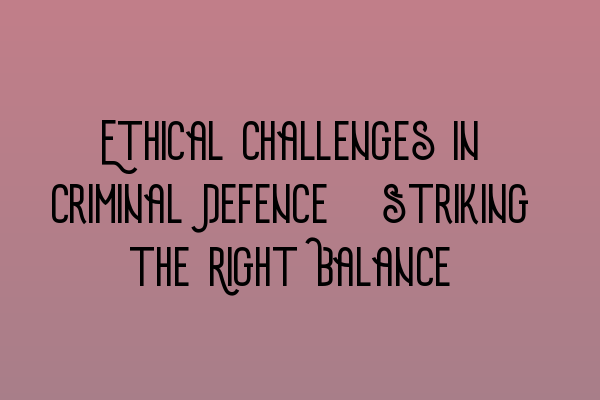Ethical Challenges in Criminal Defence: Striking the Right Balance
As criminal defence solicitors, we often find ourselves grappling with a multitude of ethical challenges. The nature of our work requires us to navigate the delicate balance between upholding the principles of justice and ensuring the protection of our clients’ rights. In this article, we will explore some of the most prevalent ethical dilemmas faced by criminal defence practitioners and discuss the importance of striking the right balance.
The Duty of Confidentiality
One of the fundamental pillars of the solicitor-client relationship is the duty of confidentiality. We are obliged to maintain the utmost secrecy regarding any information disclosed to us by our clients. This duty arises from the need to create an atmosphere of trust and enable clients to be completely forthcoming about their case.
However, this duty can sometimes clash with our ethical obligation to prevent harm or the commission of illegal acts. For instance, if a client reveals plans to commit a serious crime, we may find ourselves torn between respecting their confidentiality and protecting public safety. Striking the right balance in such situations is crucial.
It is important to note that the duty of confidentiality extends beyond just withholding information from the police or prosecution. It also encompasses protecting clients from intrusive media attention and ensuring their right to a fair trial. Lawyers must carefully navigate these complexities to ensure their ethical obligations are met while fulfilling their duty to their client.
Zealous Advocacy and the Search for Truth
As criminal defence solicitors, we are tasked with providing zealous advocacy for our clients. This means representing their interests to the best of our abilities and challenging the prosecution’s case at every turn. However, this pursuit of justice must be balanced with the ethical duty to the court and the search for truth.
In our quest to defend our clients, we may come across evidence that raises doubts about their innocence. It is essential for us to assess the veracity of such evidence and present it to the court in an ethical manner. We must not mislead the court or manipulate the truth in an attempt to secure an acquittal. Our duty is not just to our client but also to the administration of justice.
By maintaining this delicate balance, we can ensure that our advocacy remains effective, ethical, and consistent with our professional obligations. It is through this approach that we preserve the integrity of the criminal justice system.
Conflicts of Interest
Conflicts of interest are another significant ethical challenge faced by criminal defence practitioners. We may find ourselves in situations where we are obliged to represent multiple clients with conflicting interests. Striking the right balance in these circumstances is essential to maintain our professional integrity and avoid undermining the interests of any party involved.
Identifying and managing conflicts of interest requires us to disclose any potential conflict to our clients and seek their informed consent to proceed. In certain cases, it may be necessary to refer one or more clients to alternative representation to avoid any harm to their interests. Transparency and communication are key in navigating these ethical challenges.
The Importance of Continuing Education
In order to effectively address the ethical challenges in criminal defence, it is crucial for solicitors to engage in continuing education. Staying up-to-date with changes in legislation, legal precedents, and ethical guidelines enables us to navigate the complexities of our profession with confidence and integrity.
Organizations like SQE Criminal Law & Practice Law UK offer comprehensive preparation courses for aspiring criminal defence solicitors. These courses not only equip individuals with the necessary legal knowledge but also emphasize the importance of ethical considerations in the practice of criminal law. By investing in such courses, solicitors can enhance their skills and ensure they are equipped to strike the right balance when faced with ethical dilemmas.
In conclusion, ethical challenges are an inherent part of the criminal defence profession. Striking the right balance requires us to uphold the duty of confidentiality, provide zealous advocacy while searching for truth, navigate conflicts of interest, and remain committed to continuing education. By maintaining a strong ethical foundation, criminal defence solicitors can ensure that justice is served while protecting the rights of their clients.
Related Articles:
